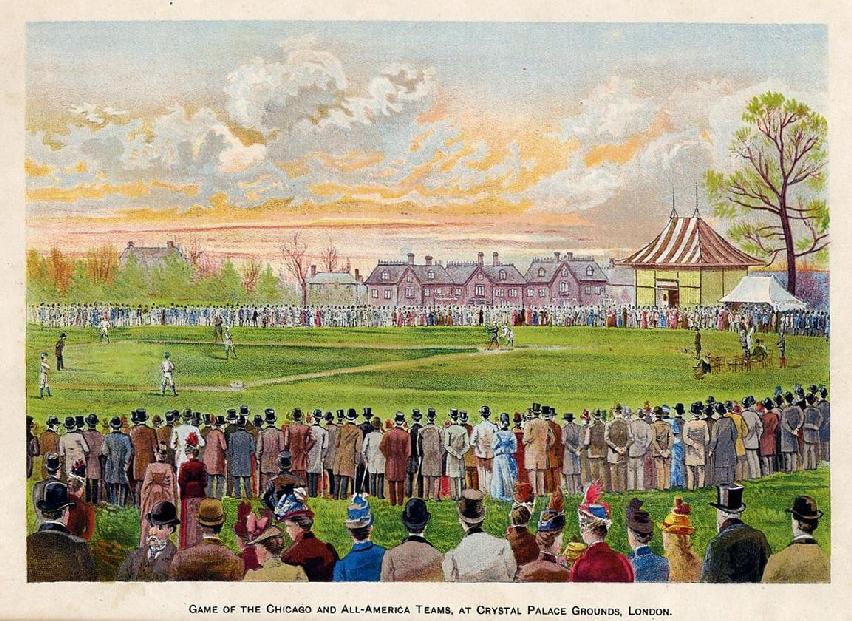
Two Peoples Divided by a Common Ballad: The London Series, the Rise of Baseball in the UK, and an Ancient Legend
#LondonSeries #FestivalofBaseballUK #MLBintheUK @mlblondonseries @mlbuk @MLBUKCommunity @baseball_ref @thorn_john @SABR @baseballhof @BaseballBrit #CaseyattheBat
Among the many observances of baseball history this year is one that should not escape notice. On June 8th and 9th, the Mets and Phillies split a two-game series at London Stadium, with the Mets coming back in the top of the 9th to tie and then lead the game, then holding on to win 6-5 with a dramatic double play in the bottom of the frame. On June 29-30, 2019, the Red Sox and Yankees played the first two regular-season MLB games ever played in Britain (or in Europe, more generally). In reality, the first professional baseball games--exhibition games--had been played in Britain in the 1870's, with amateur clubs springing up in response. Then in the spring of 1889, baseball's indefatigable promoter, entrepreneur, and chronicler--Albert Goodwill Spalding--brought his All-Star and Chicago White Stockings teams to London on the last leg of their 'round-the-world tour. They played on the grounds of the Crystal Palace, located in a southeast suburb of London on Sydenham Hill--about twelve miles from where the Yankees and Red Sox will play at the London Stadium, which was originally constructed for the 2012 London Olympics.

London Stadium, where the #LondonSeries will be played June 29-30
"'It was desirable,' [ said Spalding at a dinner in London], 'that there should be some sport in which the people of England and America could come together upon an equal footing, and at the same time take a lively interest in it.' He hoped some English friends would take up baseball and introduce it as an English sport, and if they came to America he would guarantee them a cordial reception and magnificent crowds."[1]
Spalding graciously allowed in his remarks that the game of "rounders," originated in Britain, could well have been a predecessor of the game of "base ball" as it had evolved in America. In France, his hosts had noted some parallels with an old Roman ball game known in that corner of the former Empire. But Spalding was no antiquarian. "He did not know where the game came from, nor did he care," reported the Standard, "but he did know that it was the only game that had been taken around the world."
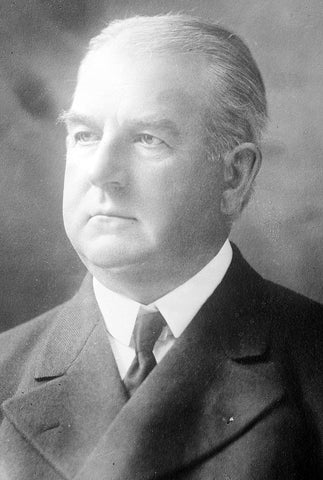 [
[
Albert Goodwill Spalding 1849-1915, National Baseball Hall of Fame (1939). A star pitcher in the 1870's, Spalding went on to become baseball's chief chronicler and promoter. He was president of the Chicago White Stockings (today's Chicago Cubs) during their 'round-the-world tour in 1888-89.
Whether in response to the excitement generated by the Spalding tour, or because Britons were predisposed to the adoption of a modern pastime which could be played in three hours rather than over five days, the National Baseball League of Great Britain and Ireland was established in 1890. Baseball has been played in the United Kingdom ever since, with a four-tiered league system run by the British Baseball Federation, as well as various independent leagues, a Great Britain Baseball Academy, university competitions, and representation in the European Baseball Championships and World Baseball Classic. Organized UK baseball capped off a period of pre-World War II popularity with a victory over the United States team in the 1938 Amateur World Series. (Read more about "Baseball in the UK" here).
It may also surprise U.S. fans to know there are fan clubs in the UK for most of the American MLB teams, watching afternoon games on cable at hours when they can be comfortably viewed in the evenings throughout Britain and Ireland. Each team has a social media community (@BravesintheUK; @UKPhillies; @UKRedsMLB; @PadresUK and so forth) as enthusiastic about wins and depressed over losses as hometown fans in the U.S.
During the early part of the 2019 season, @BaseballBrit superfan Joey Mellows (from Portsmouth, England) chronicled his frenetic baseball odyssey from Japan to Seattle and across the United States, pursuing his dream of attending 162 games during the 2019 season. Before the Red Sox and Yankees played in London at the end of June, Mellows' goal was to stir up interest and enthusiasm for baseball in the British press. Mellows personified the international aspect of baseball's appeal: as a Brit working abroad, he attended his first game in Japan in 2015, supported the LG Twins in South Korea, and witnessed Ichiro Suzuki playing his final game in Japan. But also, night after night, Mellow experienced the exuberant particularity of major, minor, independent league and college baseball in cities and towns across the vast divides of the American continent.
Joey Mellows--perhaps like Alexis de Tocqueville before him--communicates the enthusiasm of British expatriates toward the universal game of baseball. In the meantime, no one can articulate the milestones of baseball's historic past better than MLB's official historian--and philosopher-- John Thorn in his essay "Why Baseball: An American Eden of the Mind:"

"It is true... that baseball is a sort of Rosetta Stone for deciphering our still revolutionary experiment in nationhood," continues Thorn, but as Caseyatthe.blog has suggested, there are themes embedded in baseball even more venerable than those illuminating America's national identity. We in America have been exposed to these verities since 1888 through a poem--a ballad--written by a young man from Worcester, Massachusetts. These dramatic verses, known as "Casey at the Bat," convey to us the mythic elements of ancient drama inherent in the hero's confrontation with fate: hamartia (the "fatal flaw"), hubris (excessive pride or self-confidence), and the ennobling catharsis which is the effect of tragedy on the spectator. As Aristotle observed long ago, "Poetry is more philosophic, and more deserving of attention, than history. For poetry speaks more of universals, but history of particulars." Baseball draws us into the fascination of its particulars; "Casey at the Bat" reminds us of the game's universals.
These are insights with which Ernest Thayer's "Casey at the Bat" has enriched our American game and our American mythology. But just as major league baseball is exerting its universal appeal--in Tokyo, Monterrey, and London-- so also expands the claim to universality of baseball's most famous ballad.
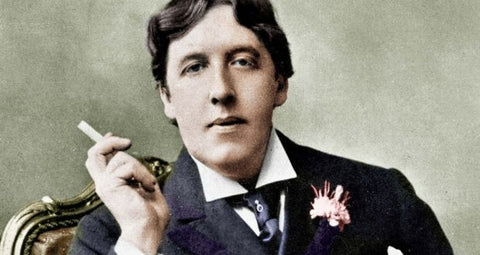
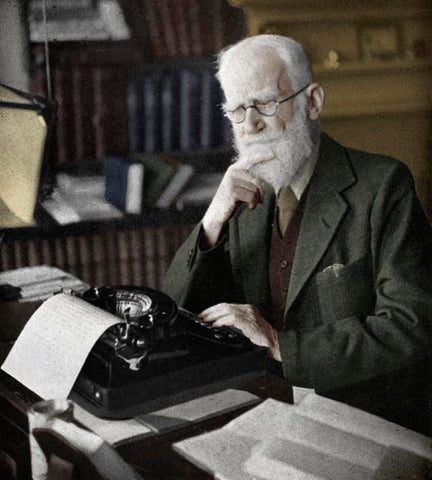
Oscar Wilde ( 1854-1900 ) and George Bernard Shaw ( 1856 - 1950 ): "Two peoples divided by a common language" is a witticism to which both may claim a share
In 1887 appeared a short story, "The Canterville Ghost" by the renowned aesthete and playwright Oscar Wilde. As the narrator describes one of the characters: "She was quite English, and was an excellent example of the fact that we have really have really everything in common with America nowadays, except, of course, language." Perhaps, according to the online Quote Investigator, this was the genesis of a witticism that by the mid-1940's had become attributed to George Bernard Shaw (or even sometimes to Winston Churchill), and had evolved into its best-known form: "Britain and America are two peoples divided by a common language."

Thomas Babington Macaulay (1800-1859) "I amused myself with trying to restore some of these long perished poems," wrote Macaulay about the Lays of Ancient Rome.
In 2019 as major league baseball returned to Britain, iI advanced the proposition that America and Britain also represent two peoples divided by a common ballad. For in fact, the ballad known in America as "Casey at the Bat" can be recognized as a variant -- a misprision or "creative misreading" in Harold Bloom's terms--of the ballad "Horatius." One of four Lays of Ancient Rome penned by British historian and parliamentarian Thomas Macaulay, the ballad published in 1842 became known in America as "Horatius at the Bridge" for its dramatic setting at the Sublician Bridge across the Tiber.
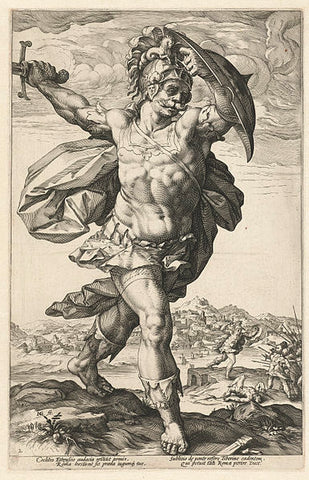 Engraving of Horatius in battle by Hendrik Goltzius, 1586
Engraving of Horatius in battle by Hendrik Goltzius, 1586
It was here, on the western approach to the bridge in 510 BC, that the Roman captain of the guard, Horatius "Cocles" (One-Eye) stood to defy the might of the Etruscan army led by overlord Lars Porsena. Flanked by two sturdy wingmen, Horatius confronted the Etruscans at the narrow bridgehead while his countrymen chopped away at the wooden pilings and abutments behind him. In three vicious rounds of single combat (in Macaulay's version), Horatius and his companions held back the Etruscan vanguard long enough for the Romans to collapse the entire span into the Tiber and to preserve their infant Republic. This was a legend which would resonate far across the centuries to inspire American colonists challenging the might of the British empire in the 18th century, and to embolden Winston Churchill and his countrymen defying the Luftwaffe and Wehrmacht in the 20th.

In 1888, when "Casey" was written, Churchill would win a prize[2] at Harrow for declaiming 1,200 lines of the Lays of Ancient Rome, including the seventy-stanza epic, "Horatius." Churchill would draw on the example of Horatius to inspire the British to defy the threat of Nazi invasion.
Macaulay, in turn, had taken his inspiration from the Roman historian Livy, writing in the Augustan age about the long-ago Roman Republic. Macaulay endeavored to recreate the ancient ballads which the scholars of his day believed had been the source of stories recorded by Livy and other later historians of Rome's earliest days. "I amused myself," wrote Macaulay, "...with trying to restore some of these long perished poems." Macaulay went so far as to place his collection of ballads in historic context, each with an introduction explaining how notional minstrels or balladeers might have regarded the heroic episodes of a distant past.
English critic Matthew Arnold (1822-1888) found in the Lays of Ancient Rome the touchstone of the "grandly bad" in poetry. But this assessment is too harsh: Macaulay's histories, essays, and poetry were adored in America by Henry Wadsworth Longfellow, William Dean Howells, and Louisa May Alcott, among thousands of others. British soldiers in the first World War often recalled the defense of the ancient Roman bridge in describing their own experiences of battle; Churchill relied upon the example of Horatius to inspire his countrymen during the War against Hitler; and generations of British schoolboys kept alive the Lays of Ancient Rome well into the 20th century.

J.R.R. Tolkien as a schoolboy (1892-1973)
The teen-aged J.R. R. Tolkien and his pals at King Edward's School took their rugby seriously--though not too seriously--as evidenced by Tolkien's first attempt at epic poetry, 'The Battle of the Eastern Field' between the "Reds" and the "Greens", written for the school's Chronicle and closely modeled on Macaulay's style in "The Battle of Lake Regillus" one of the Lays of Ancient Rome .

England vs Wales ca 1870
Tolkien, of course, was a prolific borrower from the legends and languages of the past. Consider Gandalf's defiant stand at the Bridge of Khazad-dum within the ancient dwarf-realm of Moria, as the nine members of the Fellowship of the Ring make their escape from an onslaught of orcs, trolls, and ultimately, the feared demon of the Underworld--the fiery Balrog. As the fleeing Fellowship approach the fearful chasm,
"Over the bridge!" cried Gandalf, recalling his strength. "Fly! This is a foe beyond any of you. I must hold the narrow way." (Italics mine-RCD)

Gandalf at the Bridge of Khazad-dum -- Ted Naismith illustration
The "narrow way" is a figure of speech used repeatedly by Macaulay to refer to the Tiber bridge defended by Horatius Cocles (stanzas XXXVI and XLI ("to win the narrow way") and stanza LII ("scowled at the narrow way"). The term "narrow way" was certainly familiar to Tolkien's generation of schoolboys from their recitations of "Horatius". Like Horatius with Herminius and Lartius, Gandalf defended the "narrow way" flanked by his two companions--valiant defenders Aragorn and Boromir.
But while the legend of Horatius persisted in the living memory of the British public, by the mid-20th-century Macaulay's Lays of Ancient Rome had long since been relegated to the dusty storage shelves of Carnegie Libraries gracing the public squares of towns and cities across America. Why?
I would argue that although the classical legend of "Horatius" continued to resonate in Britain through two world wars, in America the popular retelling of that legend--as "Casey at the Bat"-- had far overshadowed Macaulay's predecessor ballad. Further, in several respects the American version of the legend demonstrated if not superiority, then at least a dramatic distillation of time and place not only affording Americans a unique perspective on their national game--but also providing a favorable contrast to Macaulay's heroic verses.
For one thing, "Casey" with its 52 lines in 13 quatrains was much more concise (and easier to memorize) than Macaulay's 70 stanzas. Macaulay, for example, seems to have tried out three separate endings, and unable to decide among them, concluded by keeping them all. Secondly, listeners sensed that "Casey's" conclusion was somehow more fitting and more believable than the daredevil leap by Horatius into the foaming Tiber. Even Livy, in his first-century version of the legend, as translated by T. J. Luce, regarded the Roman captain's escape as "a bit of daring that posterity was to find more praiseworthy than credible."[3]

Aristotle's commentary on the elements of drama remains relevant
Finally, observing Aristotle's conventions of classical drama, which have not been improved upon from ancient times to our own, the ballad of "Casey" brings forth emotions from the audience which Aristotle observed all great tragedy will evoke-- specifically pity and fear. The allure of happy endings notwithstanding, only tragic drama has the ennobling power to draw catharsis from its hearers, just as it did in the days of Sophocles or Aeschylus. And as for humor, Thayer's iconoclastic perception of "the broken edges of things that appear whole"--as recorded by his like-minded classmate George Santayana--found ample opportunity for parody or misprision in Macaulay's far more ambitious endeavor.
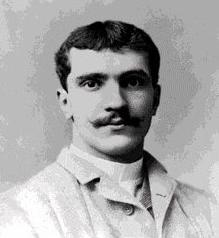
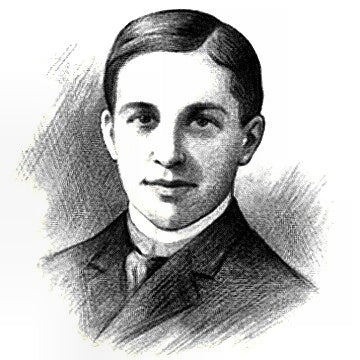
George Santayana (at left) and Ernest Thayer as they appeared at Harvard in the 1880's. Writing his memoir in the 1940's, Santayana recalled his friend and fellow Lampoon contributor: "...He seemed a man apart, and his wit was not so much jocular as Mercutio-like, curious and whimsical, as if he saw the broken edges of things that appear whole, and a feeling...that the absurd side of things was pathetic." --George Santayana, Persons and Places (New York: Scribner, 1943), p. 197.
And how do we know that "Casey at the Bat" is in fact a modern version of an ancient legend--a "thrice told tale" reworking both Macaulay's rollicking ballad and Livy's historic fable? Many parallels of form and content can be cited, but perhaps more conclusive evidence is offered by Caseyatthe.blog in the form of "Horatius ad pontem" (see below)-- an imagined version of the Roman legend that the young Ernest Lawrence Thayer might have drafted as he contemplated an ancient format for a contemporary baseball ballad.
Santayana described Thayer's unique brand of humor as "Mercutio-like" -- referring to Romeo's friend in Shakespeare's play. Mercutio's humor could be witty, punning, coarse, and even sharp-edged. But whether we would ascribe it to mischief or pathos, in writing "Casey at the Bat," Thayer would take Macaulay's ballad and turn it on its head. Macaulay's antagonist becomes Thayer's protagonist; Macaulay's Etruscan Empire becomes Thayer's Mudville; Macaulay's heroic saga becomes Thayer’s epic tragedy. So there is an aspect of Casey's ballad that can be only understood as the Greeks would have portrayed it.
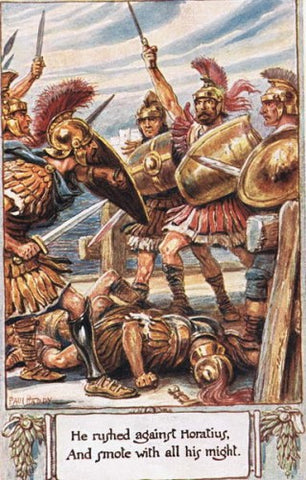
There are many artistic depictions of the Roman captain Horatius from medieval times through the 19th century, but almost none of his principal Etruscan adversary from Thomas Macaulay's version of the legend. English illustrator Paul Hardy (1862-1942) provides a rare image of the assault on Horatius by Astur, Lord of Luna (at right, with upraised sword) -- the gallant Etruscan champion upon whom "Casey" would later be modeled.
On the occasion of the #LondonSeries, celebrating the flourishing of baseball within that scepter'd isle whose verdant landscape conceals so many reminders of ancient contests, let the English-speaking peoples no longer be divided, but let them be united by a common ballad! And in the meantime Caseyatthe.blog will continue to promote the verse translation of Casey's ballad into all the languages of every nation where baseball is played! (See, for example, elsewhere in this blog "Queci al bate" and Vive la France! Et Vive "Casey au bâton" .
Horatius ad pontem

Lars Porsena before the gates of Rome - John Reinhard Weguelin
I
The signs were inauspicious on the Roman line that day,
As Etruria's marauding hordes marched up in dread array,
And Etruscan armies rallied to reclaim the Tarquins' throne--
Dire forebodings roiled the Tiber like the ripples from a stone.
II
A faithless few fled in retreat across the Sublician bridge,
But outposts kept a trusty watch upon Janiculum's ridge--
They thought, if we can keep the bridge, we'll surely save the town:
Yet who among the guards will stand to face the Tuscans down?
III
But the attack upon Janiculum has overwhelmed the walls,
And sent the stout defenders down to Pluto's dismal halls;
Then upon the Roman multitudes dark melancholy fell,
For it seemed no man could turn the tide nor stem the Stygian swell.
IV
When up stepped Spurius Lartius, of a Roman family proud,
And with him stood Herminius, both undaunted and unbowed;
And as the fearsome hordes poured down before the span,
One took the left, and one the right, to halt the Tuscan van.
V
Then from the Roman multitudes there rose a mighty cry--
Uplifted to Olympus where the gods kept watch on high--
Resounding from the seven hills, rebounding from the ridge,
For Horatius, one-eyed Cocles, was advancing to the bridge.
VI
With confidence of manner, Horatius took his place,
And, with his two companions, lifted shield, and sword, and mace--
They signaled to the Consul, who stood by with his axe,
"We'll hold the bridge in front, whilst you destroy it at our backs."
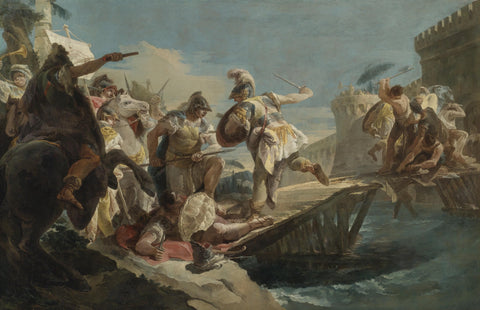
Follower of Giovanni Batista Tiepolo (1696-1770), "Horatius Cocles"
VII
Etruria's spearmen trod the ground toward the narrow way
Where the valiant Three stood interposed before that grim array;
When suddenly from Roman walls an angry clamor rose:
For the Tarquin villain Sextus was espied amongst their foes!

Etruscan warrior figure, 6th century BCE
VIII
Though Horatius in his grandeur, scarce deigned to turn his head--
From Tuscan ranks a deadly dart in stealthy silence sped:
It spared the Roman's helm , but smote him in the thigh--
"Hoc leve est!" quoth Cocles, "What bee hath stung anigh?"
IX
From beyond the rolling Tiber, there went up a raging roar
Like the clashing of the winter waves upon a granite shore--
"Kill him! Kill false Sextus!" shouted thousands from the strand;
And they likely would have killed him, had not Cocles raised his hand.
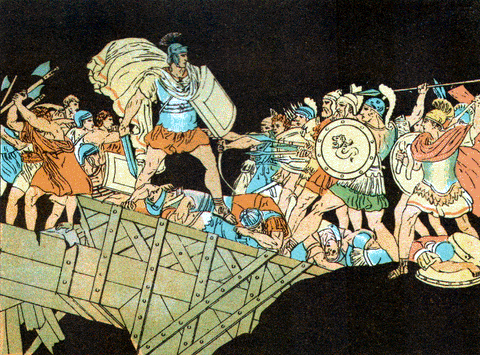
"Horatius" attributed to Paul Edouard Rischgitz (1828-1909)
X
With a smile of true forbearance, the captain's visage shone;
He quelled the rising chaos; he bade the war go on--
Yet when a cloud of Tuscan spears had clattered from the skies,
The Romans' shout of "Vivit!" filled their foes with bleak surmise.
XI
"Turpe fraudem!" cried the Tuscans, calling vainly on their gods--
Fronting three with ninety thousand, did they not possess the odds?
But behold! the Roman axes have destructively been plied,
And now the bridge hangs tottering above the foaming tide.
 Trade card depicting Horatius' leap into the Tiber, French School, 19th century
Trade card depicting Horatius' leap into the Tiber, French School, 19th century
XII
"Back now," cried the Consul, and Herminius ran back;
And Lartius strove to join him, though he felt the timbers crack--
But now the Tuscans heft their shafts, and now they make their lunge --
And now all Rome stands breathless as Horatius takes his plunge.

"The Wounded Horatius Swimming the Tiber," by follower of Giovanni BatistaTiepolo (1696-1770)
XIII
Oh, somewhere in fair Italia the Sol Invictus shines,
And maidens tread the golden grapes among the verdant vines;
But 'round Etruria's meager hearth, when the north wind wails about,
Dire tales are told of brigands bold: Horatius has swum out!
*"Horatius ad pontem / Horatius at the Bridge: A Ballad of the Republic" © All rights reserved by Richard Collins Davis and Caseyatthe.blog

Pressing Grapes - John Reinhard Weguelin (1849-1927)
[1] The Standard, London, 18 March 1889.
[2] Randolph S. Churchill, Winston S. Churchill: 1874-1900 (London: Heinemann, 1966), p. 112.
[3] Livy: The Rise of Rome, Books 1-5 [Oxford, Oxford University Press, 1998/2008], p. 81).
[4] Thayer's graduation address at Worcester's Classical and English High School in 1881 was entitled "Roman Polytheism." He carried a solid grounding in Latin, Greek, and the classics with him to Harvard.
Cover illustration: Baseball game on the Crystal Palace grounds, London, March 1889, during the All-Star and Chicago White Stockings globe-circling tour, organized by team president Albert Goodwill Spalding.
 Engraving of Horatius in battle by Hendrik Goltzius, 1586
Engraving of Horatius in battle by Hendrik Goltzius, 1586 Trade card depicting Horatius' leap into the Tiber, French School, 19th century
Trade card depicting Horatius' leap into the Tiber, French School, 19th century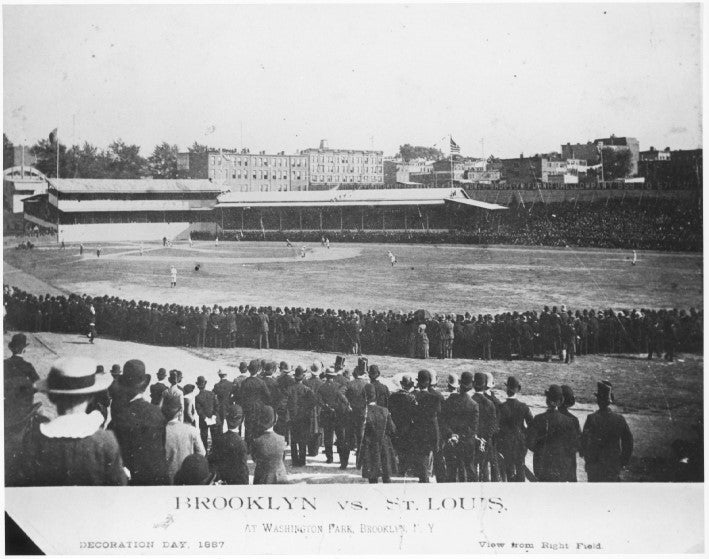
![Take Me Out to the Ball[ot] Game -- Baseball, Women's Suffrage, and Trixie Friganza](http://caseyatthe.blog/cdn/shop/articles/Suffragette_Trixie_Friganza_NY_George_Grantham_Bain_Collection.jpg?v=1603296892&width=500)
1 comment
Spellbinding prose.
Dan
Leave a comment
This site is protected by hCaptcha and the hCaptcha Privacy Policy and Terms of Service apply.